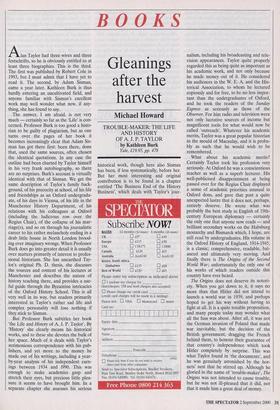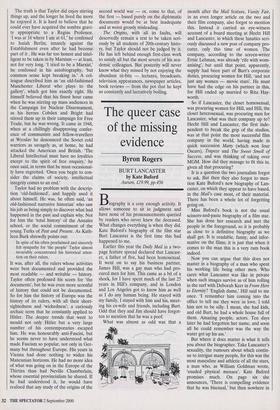BOOKS
Gleanings after the harvest
Michael Howard
TROUBLE-MAKER: THE LIFE AND HISTORY OF A. J. P. TAYLOR by Kathleen Burk Yale, £19.95, pp. 478 Alan Taylor had three wives and three festschrifts, so he is obviously entitled to at least three biographies. This is the third. The first was published by Robert Cole in 1993, but I must admit that I have yet to read it. The second, by Adam Sisman, came a year later. Kathleen Burk is thus hardly entering an uncultivated field, and anyone familiar with Sisman's excellent work may well wonder what new, if any- thing, she has found to say.
The answer, I am afraid, is not very much — certainly so far as the 'Life' is con- cerned. Professor Burk is too good a histo- rian to be guilty of plagiarism, but as one turns over the pages of her book it becomes increasingly clear that Adam Sis- man has got there first: been there, done that, used the same sources, often chosen the identical quotations. In any case the outline had been charted by Taylor himself in his very frank autobiography, so there are no surprises. Burk's account is virtually identical with that of Sisman. We get the same description of Taylor's family back- ground, of his precocity at school, of his life and friendships as an Oxford undergradu- ate, of his days in Vienna, of his life in the Manchester History Department, of his relations with his colleagues at Oxford (including the ludicrous row over the Regius Chair), of the collapse of his mar- riage(s), and so on through his journalistic career to his rather melancholy ending in a drab little house in North London brood- ing over imaginary wrongs. When Professor Burk does go into greater detail it is usually over matters primarily of interest to profes- sional historians. She has unearthed Tay- lor's original Ph. D. thesis, she discusses the sources and content of his lectures at Manchester and describes the nature of history teaching there, and provides a use- ful guide through the Byzantine intricacies of the Oxford History School. This is all very well in its way, but readers primarily interested in Taylor's rather sad life and complex personality will lose nothing if they stick to Sisman.
But Professor Burk subtitles her book `the Life and History of A. J. P. Taylor'. By `History' she clearly means his historical works, and to these she devotes the bulk of her space. Much of it deals with Taylor's acrimonious correspondence with his pub- lishers, and yet more to the money he made out of his writings, including a year- by-year analysis of his independent earn- ings between 1934 and 1990. This was enough to make academics gasp and stretch their eyes, but precious little plea- sure it seems to have brought him. In a separate chapter she assesses his serious historical work, though here also Sisman has been, if less systematically, before her. But her most interesting and original contribution is to be found in a chapter entitled 'The Business End of the History Business', which deals with Taylor's jour- nalism, including his broadcasting and tele- vision appearances. Taylor quite properly regarded this as being quite as important as his academic work, and not only because he made money out of it. He considered his audiences in the W. E. A. and the His- torical Association, to whom he lectured copiously and for free, to be no less impor- tant than the undergraduates of Oxford, and he took the readers of the Sunday Express as seriously as those of the Observer. For him radio and television were not only lucrative sources of income but magnificent tools for what would now be called 'outreach'. Whatever his academic merits, Taylor was a great popular historian in the mould of Macaulay, and it is proba- bly as such that he would wish to be remembered.
What about his academic merits? Certainly Taylor took his profession very seriously. At Oxford he was a conscientious teacher as well as a superb lecturer. His well-publicised disappointment at being passed over for the Regius Chair displayed a sense of academic priorities unusual in Oxford dons, and gave that post a quite unexpected lustre that it does not, perhaps, entirely deserve. He wrote what was probably the best study in English of 19th- century European diplomacy — certainly the only one that anyone now reads — and brilliant secondary works on the Habsburg monarchy and Bismarck which, I hope, are still read by undergraduates. His volume in the Oxford History of England, 1914-1945, is a classic; comprehensive, readable, bal- anced and ultimately very moving. And finally there is The Origins of the Second World War; unfortunately the only one of his works of which readers outside this country have ever heard.
The Origins does not deserve its notori- ety. When you get down to it, it says no more than that Hitler did not intend to launch a world war in 1939, and perhaps hoped to get his way without having to fight at all. It is a quite tenable proposition, and many people today may wonder what all the fuss was about. After all, it was not the German invasion of Poland that made war inevitable, but the decision of the British government, dragging the French behind them, to honour their guarantee of that country's independence which took Hitler completely by surprise. This was what Taylor found in 'the documents', and he was genuinely astonished by the hor- nets' nest that he stirred up. Although he gloried in the name of 'trouble-maker', The Origins was not intended to cause trouble, but he was not ill-pleased that it did, nor that it made him a great deal of money. The truth is that Taylor did enjoy stirring things up, and the longer he lived the more he enjoyed it. It is hard to believe that he could ever have acquired the sombre gravi- ty appropriate to a Regius Professor. `I was at 16 where I am at 61,' he confessed to Isaiah Berlin; innately against the Establishment even after he had become part of it . He was far too honest and intel- ligent to be taken in by Marxism — at least, not for very long. 'I tried to be a Marxist,' he confessed in his autobiography, 'but common sense kept breaking in.' A col- league described him as 'an old-fashioned Manchester Liberal who plays to the gallery', which got him exactly right. He himself believed that his finest hour came when he was stirring up mass audiences in the Campaign for Nuclear Disarmament, as his heroes Cobden and Bright had stirred them up in their campaign for Free Trade, but he was wrong. It came in 1948, when at a chillingly disapproving confer- ence of communists and fellow-travellers at Wroslav he denounced the Soviet cold warriors as savagely as, at home, he had attacked the American and British. 'The Liberal Intellectual must have no loyalties except to the spirit of free enquiry,' he once said, in terms that he must occasional- ly have regretted. 'Once you begin to con- sider the claims of society, intellectual integrity comes to an end.'
Taylor had no problem with the descrip- tion 'old-fashioned', and happily used it about himself. He was, he often said, 'an old-fashioned narrative historian' who saw his job as being simply to discover what had happened in the past and explain why. Not for him the 'total history' of the Armies school, or the social commitment of the young Turks of Past and Present. As Kath- leen Burk shrewdly points out:
In spite of his often proclaimed and sincerely felt sympathy for 'the people' Taylor almost invariably concentrated his historical atten- tion on their rulers.
It was, after all, the rulers whose activities were best documented and provided the most readable — and writable — history. Taylor often professed his scorn for 'the documents', but he was even more scornful of history that could not be documented. So for him the history of Europe was the history of its rulers, with all their short- sightedness and 'wickedness'; a curiously archaic term that he constantly applied to Hitler. The deeper trends that went to mould not only Hitler but a very large number of his contemporaries escaped him. He was honourably anti-Fascist, but he seems never to have understood what made Fascism so popular, not only in Ger- many but throughout Europe. His years in Vienna had done nothing to widen his Mancunian horizons. He had no more idea of what was going on in the Europe of the Thirties than had Neville Chamberlain, whose essential provincialism he shared. If he had understood it, he would have realised that any study of the origins of the second world war — or, come to that, of the first — based purely on the diplomatic documents would be at best inadequate and at worst grossly misleading.
The Origins, with all its faults, will deservedly remain a text to be taken seri- ously by all students of 20th-century histo- ry, but Taylor should not be judged by it. He has left behind enough first-class work to satisfy all but the most severe of his aca- demic colleagues. But posterity will never know what they missed by not enjoying the abundant tit-bits — lectures, broadcasts, television appearances, newspaper articles, book reviews — from the pot that he kept so constantly and lucratively boiling.



























































 Previous page
Previous page